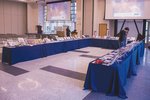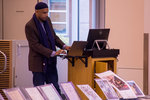



There’s no question that Centralia residents are proud of their town’s African-American founders George and Mary Jane Washington. One need look no further than the bronze statue of the pair standing within their namesake city park.
The Hub City’s unique entry into the annals of American black history doesn’t make it immune to knowledge gaps that plague communities big and small across the United States. That gap is what led Kahlid el-Hakim to found the Black History 101 Mobile Museum that travels the country and displays artifacts of black memorabilia from the era of the slave trade to present day.
Thursday brought el-Hakim to the Transalta Commons at Centralia College, where he set up a horseshoe of tables showing his “Signature Series” anthology. A prolific collector of black history memorabilia, he created the mobile museum in 2006 but traces its origins back another decade.
“It was an experience I had while attending the Million Man March (in Washington, D.C.) in 1995,” el-Hakim said. “We were told by a speaker to go back to our communities and find ways to help transform the way people looked at and understood us. My goal is to spark conversations between people that aren’t happening at home or at work, and explore topics not taught enough in schools.”
One of the first items to catch people’s eyes as they begin to walk through the museum is a flyer from 1829 advertising a slave auction. White supremacist literature from the 1800s is spread across the first few tables, along with a Ku Klux Klan bumper sticker with the tagline “Original Boys in the Hood.”
Further along are various pieces of memorabilia, including albums, signed by people ranging from Martin Luther King, Jr. and Malcom X to rapper Eazy-E. The whole display is linear in nature and includes political artifacts on display alongside items of popular culture from the same time period.
“It’s not a display we can have permanently, so we value the fact they can come in and bring artifacts,” said Centralia College President Robert Mohrbacher. “They bring a different collection of items each time, so even if you’ve seen it before, you can learn something new.”
An oversized leaflet published by the Black Panther Party caught the attention of Centralia College students Daryl Leischner and Mikaela Dean.
“It’s something I haven’t seen before, where it lists the platform of the party,” Dean said. “Things like equal rights and an end to police brutality — the same sorts of things people of color are asking for today, more than 50 years later.”
Exposing patrons to new historical figures and events is one aspect of el-Hakim’s mission. Another is prompting people to recall and reflect on their own histories. He often receives emails or notes in the mail with personal stories dating back decades.
One such letter came from a man living in Ireland who stumbled onto the mobile museum’s website. He was a cadet in the U.S. Navy in the 1950s when he walked into a Woolworth’s in North Carolina and sat at the counter next to a group of African-American women. According to the man, a pair of white men pulled him away from the counter so they could attack the black women for sitting in the “White’s Only” section.
“(The cadet) wrote to me saying how he had wished ever since that he had stayed put and fought to protect the girls,” el-Hakim said. “I get a lot of stories like that. The impact of the museum is felt when people are able to challenge themselves and what they know about African-American contributions to history. Everything on display here is part of American history.”
The museum ends with a table displaying artifacts of recent history such as items from Barack Obama’s presidential campaigns and the edition of GQ with NFL quarterback Colin Kaepernick on the cover.
On the same table are one of the Make America Great Again hats worn by Donald Trump and his supporters. el-Hakim said he’s seen an uptick in interest from museum patrons since Trump’s rise to the presidency.
He spent a day last February displaying his collection at the FBI academy in Quantico, Virginia. It was a little unnerving at first, he said, as a black man who was contacted by the FBI, but it was an overwhelmingly positive experience.
“It was for their Black History Month program,” el-Hakim said. “I was told over and over again there that people appreciated my being there. “That the FBI needed to be having these types of conversations.”
For more information on the museum, visit blackhistorymobilemuseum.com.